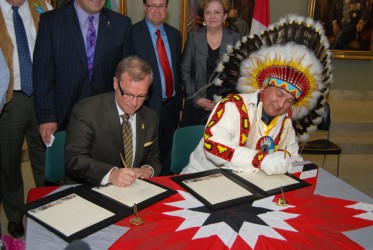Article Origin
Volume
Issue
Year
The Chief of the Federation of Saskatchewan Indian Nations is applauding the provincial government for sitting down with First Nations people at the first ever bear-pit session.
“We’re happy to see this day finally come to fruition after many months of looking at structuring a new relationship between First Nations and the province,” said FSIN Chief Guy Lonechild.
Chiefs from across the province were able to raise concerns with members of cabinet at the bear-pit session, a format for discussion usually used by members of the Saskatchewan Urban Municipality Association and Saskatchewan Association of Rural Municipalities.
“We agree on the most important things which is why we’re here in the first place — to make sure that everyone does take part in the Saskatchewan advantage,” said Premier Brad Wall.
Despite the differences that do exist, Lonechild said this is the best working relationship FSIN has ever had with the province and he hopes it continues.
“The next step might be a sweat. Maybe the premier and his cabinet come on our terms and we start talking about the spirit and the intent of the treaty relationship in the country,” said Lonechild.
Chiefs were given two minutes to raise an issue and cabinet was given three minutes to respond.
One of the top issues raised was the on-going debate over resource revenue sharing.
Lonechild insists that First Nations people deserve a share of the profits. However government remains adamantly opposed to the idea of resource revenue sharing.
“We will not support a formal revenue sharing position with First Nations and that’s an area where we don’t agree,” said Wall. “Natural resource revenue is for everyone in the province whether they are First Nations, Metis, or not. It’s the roads, it’s the hospitals, it’s the school system.”
Lonechild also asked the government to legislate businesses to consult First Nations people and employ them.
“We have to think about the greater contributions First Nations make to the economy and the labour force. Where are you going to get that labour force from? It’s going to be from First Nations people who stay and live here and who will remain here in the province,” said Lonechild.
However, Wall said the government has no intentions of regulating business.
“We need First Nations people engaged in the economy, but if you start forcing it and listing a bunch of rules — if you try to put a gun to the head of these companies — it might be counter-productive because they might just find a pace where those restrictions aren’t there and that’s not going to help anyone, First Nations or non-First Nations,” said Wall.
Other major issues of concern were highways and infrastructure on First Nations, flood mitigation, internet gaming, and education.
Lonechild said he hopes the province can be an ally in lobbying the federal government on many of these issues.
“When the federal government spends less on education and housing, the province loses out. So the province really needs to step up and be on side with First Nations agenda issues,” said Lonechild.
Wall said the province will lobby the federal government on behalf of First Nations.
In addition, Wall said the provincial government is willing to invest in certain areas such as education which is usually under the jurisdiction of the federal government.
“For example, we are on-reserve with adult basic education. We’re prepared to do that because it’s too important to wait,” said Wall.
Wall said the recent decision to form a joint-task force between the province and the FSIN on Aboriginal employment and education is one example of how the province is stepping up to the plate.
“This is very significant,” said Lonechild. “We are very pleased that the premier and cabinet have decided to move forward to look at the task force that gets underway in August.”
The task-force will consist of three people who will travel the province to learn what the needs are in Aboriginal communities in order to ensure education and employment success.
“It will really give us a good understanding of the gaps in education services,” said Lonechild.
Lonechild said the bear-pit session and the task force are two strong examples of how First Nations and the province are willing to work together.
Lonechild said chiefs from across the province were pleased with the dialogue.
“I think they overwhelmingly thought that this was a good forum to discuss these issues,” he said. “We look forward to other future discussions.”
- 2907 views

